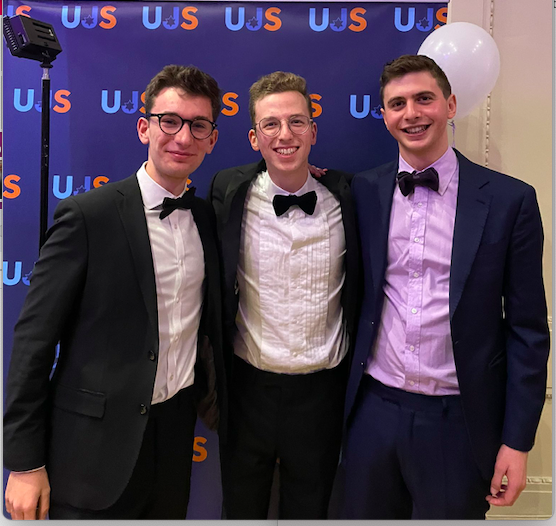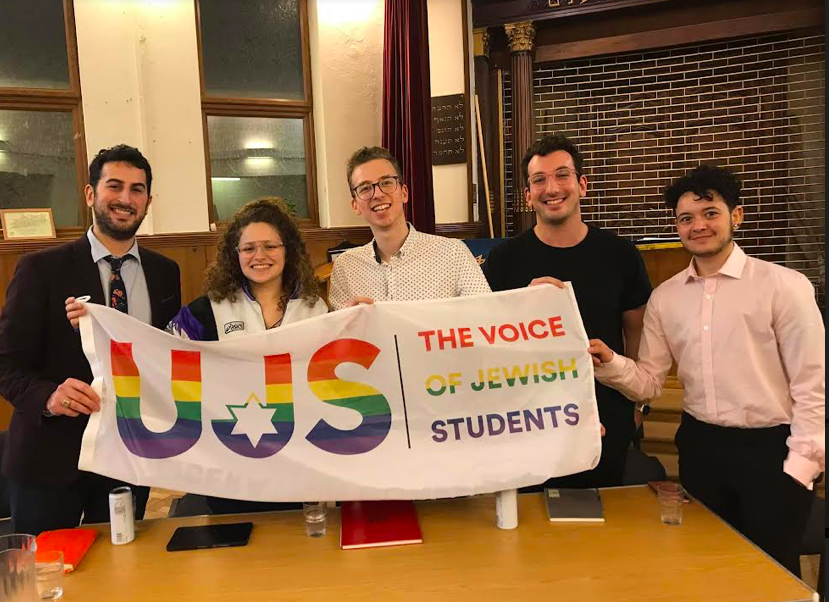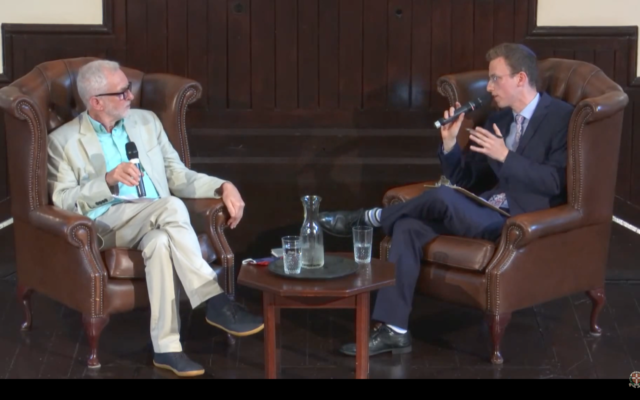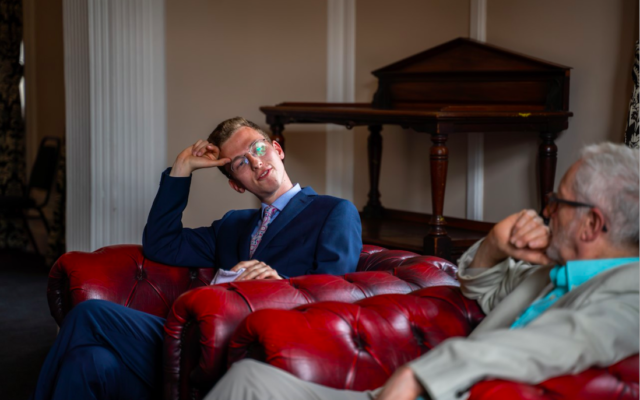New UJS president vows to ‘represent the full diversity of Jewish students’
Joel Rosen, new UJS president, was widely praised for his showdown with Jeremy Corbyn in a Cambridge Union debate, which he says convinced him of the ex-Labour leader's 'denialist mentality'
Lee Harpin is the Jewish News's political editor
He is the boy from Golders Green whose reputation soared as a result of masterful demolition of Jeremy Corbyn during an interview with the former Labour leader at Cambridge University’s debating society.
But 14 months later, Joel Rosen, the newly installed president of the Union Jewish Students, (UJS) has set himself another target.
He is now determined to go on and become the Jewish leader who is able to represent student voices from every spectrum of communal life.
“I feel like I am very hard to put in a box,” Rosen tells Jewish News, when asked why he believes he has been able succeed in student politics, having been elected to the UJS leadership role by a landslide in last December’s election.
“I think people saw me as someone they uniquely might not be able to categorise.
“Someone who was very much born and bred in Golders Green in the Orthodox community, but who was a member of Labour, who was active in combating antisemitism, but also quite active around the campaigns around LGBT rights in schools.
“I wouldn’t fit into any neat box in terms of the community, which I think means I have lot in common with people from very different points. I hope that gives me an insight into different ways of thinking.”
Asked for his aspirations for his time as UJS president, Rosen is quick to respond.
“I want to advance diversity across our community,” he says. “I am a firm believer that JSocs should be a home for all Jews, be they Orthodox, Progressive, somewhere in between, or non-aligned.
“I am a big believer that we need to represent the full diversity of Jewish students, politically and religiously.”

Rosen,22, a former Menorah Primary School and Hasmonaean pupil, went on to City of London School’s sixth-form to complete his A-Levels.
Before reading history at Cambridge, he spent a year out in Israel, working mostly as a volunteer with Magon David Adom, staring on their white ambulances, before progressing on to their intensive care introduction.
“It exposed me to all areas of Israeli society, it was an incredibly informative experience,” says Rosen.
“I learnt how to cope with very stressful situations.
“I performed CPR on a 27-year-old who didn’t make it, which was very difficult to deal with emotionally.”
Returning to the UK to complete his degree, Rosen made national newspaper headlines in June 2021, with his sit-down interview with Corbyn, in which he the former Labour leader managed to deny point-blank any suggestion that Luciana Berger was “hounded out” of the party.
It won Rosen much praise from all sections of the Jewish community, and he reveals he was contacted afterwards by several MPs who commended him for “venting the feelings” that so many felt during the Cambridge Union showdown.
“I wasn’t anticipating it going quite as viral (on social media) as it did,” he says now.
“People contacted me to say I was voicing what they had been through, that it was a moment of release.”
Rosen was enthused that he was also contacted by a lot of Conservative supporting voices at various times during his student career to date.
He adds that his campaign to become UJS president was run by Edward Issacs, who has different political views.
He says the campaign was “not a party-political partisan” one, and he “got to know people from different political backgrounds who I respect tremendously and get on with very well.”
“I think they respected that when it was incredibly difficult to speak out, I spoke out,” he says of his wide appeal.
“There were lots of points in my university career where I was very critical of people who share my politics.”
He adds that he is often asked questions about left-wing Jewish groups, and which ones are politically ‘sound’.
“I think there’s a simple test – ask them where they were a couple of years ago,” says Rosen.” At the height of Labour antisemitism, when Jewish female MPs were being bullied, did they stand up?”
Rosen reveals that after the interview with Corbyn, the Islington North MP attempted to reassure him he was not in any shape or form an antisemite in the car-park.
“I feel like that experience confirmed what other people had said about him, there was very much an intransigence, a complete denialist mentality,” says Rosen of the Cambridge interview.
“He saw himself as the prime victim of that era.”
During the car-park exchange Rosen says he “did not want to validate” Corbyn’s pleas.

Rosen now begins his term as UJS president at a critical juncture for the community.
There is the aftermath of the Professor David Miller saga at Bristol University, where it took three years of pressure by students and communal organisations, before the sociology lecturer was dismissed.
“I think we have learned there are forms of antisemitism that are easier to fight,” he says, when asked what the Miller scandal showed the community.
“It’s easy if you have a religious fundamentalist or a white supremacist, using nazi symbols. It’s much harder when you have a subtle, subliminal, educated antisemitism of a left-wing lecturer.”
Rosen says he believes there are “hundreds” of people in higher education engaging in “conspiratorial antisemitism”, a situation he describes as “very worrying.”
But he adds “they are a fringe minority” pointing to the last campus report from the Community Security Trust (CST) which stressed the “overwhelming majority of Jewish students have a positive experience” of campus life.
Rosen says this “very much dovetails” with his own experiences
But he says the main lesson from the last few years is that “cultures of denial” need to be combated.
“I think we are doing a very good job,” adds Rosen. “The last month we been training people in universities on (recognising) antisemitism, we are training Student Unions up and down the country.”
Asked about recent reports, that can often portray a very gloomy picture of campus life for Jewish students, and comparisons by some politicians between UK universities and Nazi era Germany, Rosen says: “Any comparison of this kind.. both of my maternal grandparents fled Nazi Germany in the Second World War.
“I think we should really be careful.”
Rosen says he message to Jewish students starting university now would be an overwhelmingly positive one.
“We should all resist painting with very broad brush strokes, there’s a complex picture,” he adds.
One of Rosen’s first actions on taking up the UJS role, was to oversee the submissions sent to an independent QC ahead of her investigation into allegations of antisemitism that have dogged the National Union of Students (NUS) over a lengthy period.
The UJS have, says Rosen, been “very robust and proactive in responding to the issues of antisemitism within the NUS.”
He adds: “I think it is very clear that successive generations of Jewish students have been failed by NUS, and our response will be guided by Jewish students.”
When the report comes out, Jewish students will respond, says Rosen.
But having compiled the submission to NUS, that included so many testimonies, “reading that reminded me of some of the stuff I saw in the run-up to the EHRC report” into Labour antisemitism.
Rosen says the “onus is on the NUS” to “regain the confidence of Jewish students.. we shouldn’t shoulder the burden of making that space for ourselves, that’s a job for them.”
Another of Rosen’s first acts at UJS, was to tweet a response, to Tory leadership favourite Liz Truss’s statement to the Jewish community, which included controversial comments about the “woke” civil service.
Rosen did not hold back with his criticism on the official UJS twitter feed.
He wrote:”Jewish students have found her remarks to be ill-judged and offensive. We hope she reflects on her words, withdraws these remarks, and reaches out to our community.”
Rosen tells Jewish News:”One of our values is peer leadership. Jewish students speak for Jewish students.”
He then also refers to the words of the late former Chief Rabbi Jonathan Sacks who said ‘I am not a Jew because of antisemitism, what happens to me doesn’t define who I am.'”
Rosen adds:”People from outside of the community should listen to Jewish students. My experience is Jewish students care about a range of issues.
“They are very robust on standing up to antisemitism, but they also care about Islamophobia.
“So for instance, the same people who stood up to David Miller led the response to the JNF (over allegations of Islamophobia by Samuel Hayek).
“The idea that social justice is some kind of toxic area and we need to pick and choose who we support is a very outdated and discredited notion.”
Even more directly he adds:”There is this pernicious narrative in our community among a fringe, that says Islamophobia is a fiction, used to silence criticism of Islam and Muslims.
“I know how it feels to be told you are inventing the prejudice you face for political gain.
“That’s why we as a community shouldn’t fall foul to this way of thinking.”

Rosen offers similar concerns over those in the community now viewing the campaigns such as those around trans rights as some kind of threat to the Jewish community.
“It is a fiction to think that support for trans rights somehow threatens the Jewish community,” he adds.
“We have been very clear, every year UJS conference has vote through motions on LGBT rights. The idea that we should somehow pick and choose .. that the Jewish communities interests are not aligned with the LGBT is counter-productive.”
He adds there are now those in the community who do a “disservice to trans Jews” by viewing them as a “political football to kick around.”
Rosen is equally forthright on the debate currently going on, particularly with younger sections of the UK Jewish community, to Israel, and settlement policy in the West Bank.
As UJS president he says he will ensure “we offer Jewish students a space to express their disagreements on a whole range of topics, including Israel.”
He adds:”The fact that there is this discourse and this disagreement is healthy. It’s a sign that Jewish students are invested, that they care.
“I would rather the conversation around a JSoc Friday night dinner table was a group of engaged students from different perspectives than a group of people who were completely apathetic. One of our values is Israel engagement, but it doesn’t mean uncritical engagement.
“I think we need to realise the vast majority of Jewish students who critical engage with Israel do so because they want Israel to succeed, not to fail.
“It’s just not the same as a hostile group of Socialist Workers Party activists occupying a lecture theatre.”

Thank you for helping to make Jewish News the leading source of news and opinion for the UK Jewish community. Today we're asking for your invaluable help to continue putting our community first in everything we do.
For as little as £5 a month you can help sustain the vital work we do in celebrating and standing up for Jewish life in Britain.
Jewish News holds our community together and keeps us connected. Like a synagogue, it’s where people turn to feel part of something bigger. It also proudly shows the rest of Britain the vibrancy and rich culture of modern Jewish life.
You can make a quick and easy one-off or monthly contribution of £5, £10, £20 or any other sum you’re comfortable with.
100% of your donation will help us continue celebrating our community, in all its dynamic diversity...
Engaging
Being a community platform means so much more than producing a newspaper and website. One of our proudest roles is media partnering with our invaluable charities to amplify the outstanding work they do to help us all.
Celebrating
There’s no shortage of oys in the world but Jewish News takes every opportunity to celebrate the joys too, through projects like Night of Heroes, 40 Under 40 and other compelling countdowns that make the community kvell with pride.
Pioneering
In the first collaboration between media outlets from different faiths, Jewish News worked with British Muslim TV and Church Times to produce a list of young activists leading the way on interfaith understanding.
Campaigning
Royal Mail issued a stamp honouring Holocaust hero Sir Nicholas Winton after a Jewish News campaign attracted more than 100,000 backers. Jewish Newsalso produces special editions of the paper highlighting pressing issues including mental health and Holocaust remembrance.
Easy access
In an age when news is readily accessible, Jewish News provides high-quality content free online and offline, removing any financial barriers to connecting people.
Voice of our community to wider society
The Jewish News team regularly appears on TV, radio and on the pages of the national press to comment on stories about the Jewish community. Easy access to the paper on the streets of London also means Jewish News provides an invaluable window into the community for the country at large.
We hope you agree all this is worth preserving.






















